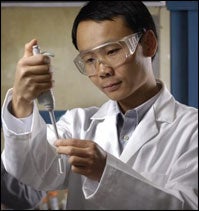Researcher wins Stand Up to Cancer grant
Hang "Hubert" Yin has won a $750,000 grant for a project with the potential of changing cancer science.
The researcher at the University of Colorado at Boulder and University of Colorado Cancer Center was awarded one of 13 Stand Up to Cancer Innovative Research Grants. He competed against more than 400 U.S. scientists.
The assistant professor of chemistry and biochemistry at CU-Boulder will receive the money over the next three years while attempting to build a new tool to probe proteins in Epstein-Bar virus. The virus benignly infects about 90 percent of all people, but also is involved in various types of lymphomas.
"If we are successful, we are going to have a very powerful tool that researchers could use to study the 25 to 30 percent of human proteins that are not accessible currently, where you could name any protein, and we can provide a specific tool with which you can study it," he said. "We can then think about new methods of treatment and prevention for lymphoma and other diseases. ...Science can move slowly, then take giant leaps ahead. This tool could be the giant leap ahead."
Proteins play pivotal roles in many biological processes, including cancer development, making them excellent targets for drugs.
"We asked our best and brightest young researchers to step outside their comfort zones and strive to make big differences with bold initiatives," said Richard D. Kolodner, Ph.D., chairman of the Stand Up to Cancer grants review committee. "If these projects come to fruition, some of the ideas could be game-changers in cancer research."
Yin is a member of the Colorado Initiative in Molecular Biotechnology directed by Nobel laureate Thomas Cech at CU-Boulder; he also is part of the developmental therapeutics team led by Gail Eckhardt, M.D., at the University of Colorado Cancer Center.
When the probe is designed, Yin said, he will collaborate with other scientists at the cancer center to test it in cell and animal models, and eventually bring it to market, either as a tool to develop a drug that targets the EBV-initiated lymphomas or a treatment in itself.
The Innovative Research Grants Program's funding comes from Stand Up to Cancer, a collaboration of the American Association for Cancer Research and the Entertainment Industry Foundation that raises money to hasten the pace of groundbreaking translational research that can get new therapies to patients quickly and save lives. Learn more about the Stand Up to Cancer initiative at http://www.su2c.org.


